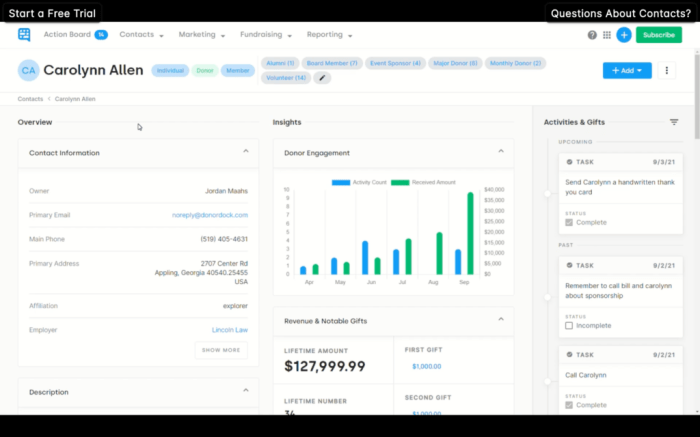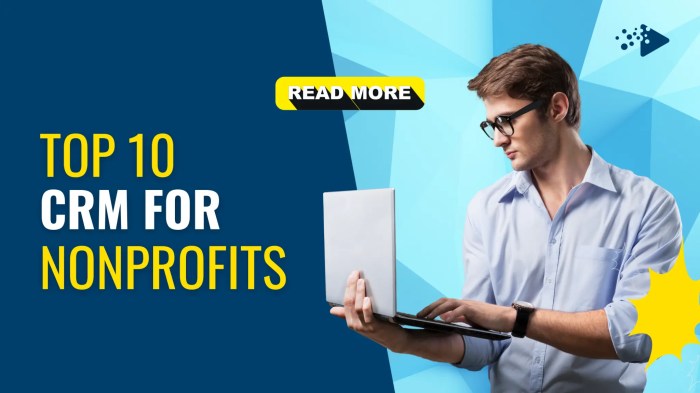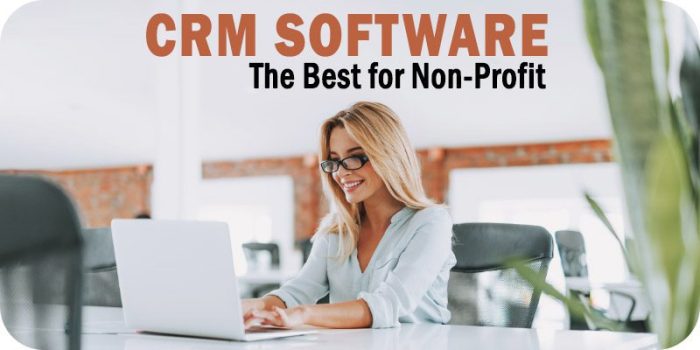Crm software for nonprofits – In today’s competitive landscape, even nonprofits need efficient tools to manage their operations. Customer Relationship Management (CRM) software offers a powerful solution, streamlining processes and maximizing impact. This comprehensive guide explores the benefits, features, and considerations for choosing the right CRM for your nonprofit organization. We’ll delve into various aspects, including donor management, volunteer engagement, fundraising optimization, and more, ensuring you’re well-equipped to make an informed decision.

Source: revopsteam.com
Understanding the Value of CRM for Nonprofits
Nonprofits often juggle multiple stakeholders – donors, volunteers, beneficiaries, and staff – requiring meticulous organization and communication. A robust CRM system acts as a central hub, consolidating all this information and providing a 360-degree view of each interaction. This holistic approach enhances efficiency, improves communication, and ultimately strengthens your organization’s impact.
Key Benefits of CRM for Nonprofits:
- Improved Donor Management: Track donations, communication history, and engagement levels to personalize interactions and cultivate stronger relationships. This includes managing recurring donations, gift acknowledgements, and donor segmentation.
- Enhanced Volunteer Engagement: Manage volunteer recruitment, scheduling, training, and communication, fostering a more engaged and satisfied volunteer base. This can also include tracking volunteer hours and skills.
- Streamlined Fundraising Efforts: Analyze donation trends, identify high-potential donors, and personalize fundraising campaigns for better results. Features like campaign tracking and reporting are invaluable.
- Improved Communication and Collaboration: Centralize communication channels, ensuring consistent messaging and efficient collaboration among staff and volunteers. This includes email marketing, event management, and social media integration.
- Data-Driven Decision Making: Gain valuable insights into your organization’s performance through comprehensive reporting and analytics. This data-driven approach allows for more strategic planning and resource allocation.
- Increased Efficiency and Productivity: Automate repetitive tasks, freeing up staff time to focus on mission-critical activities. This can significantly reduce administrative overhead.
Choosing the Right CRM for Your Nonprofit
Selecting the appropriate CRM depends on your organization’s specific needs and budget. Consider these key factors:
Essential Features to Look For:, Crm software for nonprofits
- Contact Management: Robust tools for storing and managing donor and volunteer information, including contact details, donation history, and communication preferences.
- Donation Tracking: Accurate tracking of all donations, including online, offline, and recurring gifts, with detailed reporting capabilities.
- Fundraising Management: Tools for planning, executing, and tracking fundraising campaigns, including grant management and event registration.
- Volunteer Management: Features for recruiting, scheduling, and managing volunteers, including tracking volunteer hours and skills.
- Reporting and Analytics: Comprehensive reporting tools to analyze key metrics, track progress towards goals, and make data-driven decisions.
- Integration Capabilities: Ability to integrate with other essential software, such as email marketing platforms, accounting software, and payment gateways.
- Scalability: The ability to adapt to your organization’s growth and changing needs.
- User-Friendliness: An intuitive interface that is easy for your staff and volunteers to use, even without extensive technical expertise.
- Security: Robust security measures to protect sensitive donor and volunteer data.
Popular CRM Software Options for Nonprofits
Several CRM platforms cater specifically to the needs of nonprofits. Some popular options include:
- Salesforce Nonprofit Cloud: A powerful and comprehensive solution with a wide range of features, but it can be expensive and complex.
- DonorPerfect: A dedicated fundraising CRM designed specifically for nonprofits, offering robust donor management and fundraising tools.
- Bloomerang: A user-friendly CRM with a focus on donor engagement and retention, known for its intuitive interface and excellent customer support.
- Kindful: A cloud-based CRM that emphasizes ease of use and affordability, ideal for smaller nonprofits.
- NationBuilder: A platform that goes beyond CRM, offering tools for community building, website management, and email marketing.
It’s crucial to research and compare different platforms before making a decision. Consider requesting demos, reading reviews, and consulting with other nonprofits to determine which software best aligns with your specific requirements.
Implementing and Managing Your CRM
Successfully implementing a CRM involves careful planning and execution. Here are some key steps:
Successful CRM Implementation:
- Define Your Goals and Objectives: Clearly articulate what you hope to achieve with your CRM system.
- Data Migration: Plan a thorough data migration process to ensure accurate transfer of existing data into the new system.
- User Training: Provide comprehensive training to your staff and volunteers on how to effectively use the CRM.
- Ongoing Maintenance: Regularly update and maintain your CRM system to ensure optimal performance and security.
- Data Security: Implement robust security measures to protect sensitive data.
Frequently Asked Questions (FAQ)
- Q: How much does CRM software for nonprofits cost? A: Costs vary widely depending on the platform, features, and number of users. Some offer free plans for smaller organizations, while others charge monthly or annual subscription fees.
- Q: Is CRM software difficult to learn? A: Many CRM platforms are designed with user-friendliness in mind. However, some more advanced features may require training.
- Q: Can I integrate my CRM with other software? A: Most CRM platforms offer integration capabilities with other software, such as email marketing platforms and accounting software.
- Q: How long does it take to implement a CRM? A: Implementation time varies depending on the size of your organization and the complexity of the CRM system. It can range from a few weeks to several months.
- Q: What if I need help with my CRM? A: Most CRM providers offer customer support, either through phone, email, or online resources.
Conclusion: Crm Software For Nonprofits
Investing in the right CRM software can significantly enhance your nonprofit’s operational efficiency, donor engagement, and overall impact. By carefully considering your organization’s needs and exploring the available options, you can find a solution that empowers you to achieve your mission more effectively. Remember to prioritize user-friendliness, scalability, and security when making your selection.
Call to Action
Ready to transform your nonprofit’s operations? Explore the CRM options mentioned above and find the perfect fit for your organization. Start maximizing your impact today!
FAQ Section
What are the key features to look for in nonprofit CRM software?

Source: seeromega.com
Key features include donor management, fundraising tracking, volunteer management, communication tools (email marketing, etc.), reporting and analytics, and ideally, integration with other platforms.
How much does CRM software for nonprofits cost?

Source: solutionsreview.com
Costs vary widely depending on the features, number of users, and vendor. Many offer tiered pricing plans, including free options for smaller organizations. It’s crucial to evaluate your needs and budget carefully.
Is CRM software difficult to learn and use?
Many CRMs are designed with user-friendliness in mind. However, the learning curve depends on the software’s complexity and your team’s technical proficiency. Most vendors offer training and support resources.
How can I ensure data privacy and security with my nonprofit CRM?
Choose a vendor with robust security measures, including data encryption and compliance with relevant privacy regulations (like GDPR or CCPA). Regularly review your security settings and policies.
